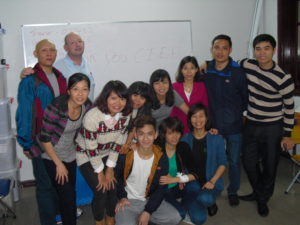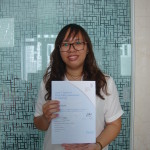We have trained teachers and trainers from the voluntary and corporate sector. The OSH literacy Certificate in Effective and Inclusive OSH Communications helps stakeholders to comply with their legal and moral obligations to make OSH communications Accessible-To-All. It is free for NGOs, if we have the time and money to get to you.
Free training and accreditation for trainers and teachers working with at-risk young people in S.E. Asia



On-site and classroom-based training for H.R. and safety-officers working with migrant construction-workers in the Middle East:



Free training for volunteers, who work with migrant domestic workers in the Middle East:


We have been invited to, attended, and presented at several major international OSH conferences: ENETOSH, ISSA and the World Literacy Summit. David has also written and published numerous articles on OSH literacy for various OSH, education, social and industry journals (see publications).






Projects for 2023/24: We were extremely proud and honoured to be invited back to speak about OSH literacy at the World Literacy Summit, Oxford University, April 2023 and to be asked to present a poster at the OSH World Congress in Sydney, Australia, November 2023, as well as the ICOH World Conference and ASSP conference in 2024, so far. We are also extremely proud and happy that the ISO published its Plain Language Guidelines on the 20th of June 2023, which we have been campaigning for a very long time as well as the publication of an OSH literacy page on Wikipedia. We are currently working with partners in Africa, Asia, Europe and the U.S., to develop a number of projects. We always welcome collaboration proposals and suggestions. However, due to work, study, finance and family commitments, our main focus will be on continuing to get OSH literacy recognized and taught in schools as the fourth (4th) essential functional skill alongside Numeracy, ICT and English.
We are currently collating all our learning resources to make them available on-line and in hard copy, which we hope will be available this year.
2019/2020 OSH literacy, ENETOSH, OSH Africa and the CIEH: Many thanks to the UK’s Chartered Institute of Environmental Health for donating 18,000 OSH training and resource books to OSH literacy and special thanks to ENETOSH for facilitating their distribution. The books and resources will go to our partners: OSH Africa. They will be distributed throughout the continent. Dave will then train trainers and teachers on how to use these valuable resources most effectively.
First-Aid and Effective and Inclusive training for swimming-instructors in Cambodia (delayed due to the pandemic):
Preventable drowning is a big killer of young people in Southeast Asia. Several NGOs are developing swimming programmes for at-risk groups. In Cambodia OSH literacy will train volunteers in Emergency First-Aid and Basic Life-Support so that they can gain international accreditation as swim instructors. We will also train instructors on how to effectively communicate training to different types and levels of learners.





































